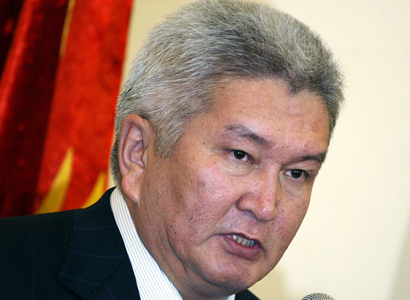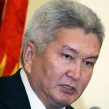
Landmark Elections in Kyrgyzstan Produce Surprising Results
Publication: Eurasia Daily Monitor Volume: 7 Issue: 185
By:

The parliamentary elections in Kyrgyzstan on October 10 were the most free and fair in Central Asia’s post-Soviet history. The Organization for Security and Cooperation in Europe (OSCE) has given its most positive feedback, emphasizing that political competition took place in a free environment, the Central Elections Commission’s (CEC) work was genuinely “impartial and independent,” and all contesting political parties had equal access to the media.
Ironically, partly because of the liberal political environment in Kyrgyzstan, mostly opposition parties, not those representing the ruling government, won the elections. Among them were Ata-Jurt, Ar-Namys and the Respublika party. Two parties responsible for instigating the regime change on April 7 –Ata-Meken and the Social-Democratic Party of Kyrgyzstan (SDPK) – may form a parliamentary minority.
Overall, the five political parties that were able to overcome the 5 percent threshold earned the following support: Ata-Jurt (8.8 percent), SDPK (8.04 percent), Ar-Namys (7.74 percent), Respublika (7.24 percent), and Ata-Meken (5.6 percent) (www.ca-news, October 11).
In line with the electoral code requirements, ethnic minorities, including Uzbek leaders, occupy strong positions in the parties’ lists. Furthermore, roughly one-third of the parliament will be composed of female Members of Parliament (MP’s).
However, Kyrgyzstan is still a long way from real political competition. The pre-electoral campaigning was mostly based on promoting political leaders rather than political ideas. Although political leaders participated in public debates, there were only a few analytical discussions that compared competing parties’ political programs.
Furthermore, two of the five parties –Ata-Jurt and Respublika– were formed in the past few months, but managed to earn support party thanks to intense political campaigning. In the case of the Ata-Jurt party, ethno-nationalist politics helped to gain majority support from ethnic Kyrgyz living in southern Kyrgyzstan. The party also advocated the return of the ousted President, Kurmanbek Bakiyev, as most of its members worked closely with the former leader. In the case of Respublika, Jamestown sources suggested that the party spent roughly $15 million on its political campaign, three times more than most other political parties.
Forming a ruling coalition might take months, as the leaders of the political parties are currently engaged in intense negotiations. SDPK and Ata-Meken are reportedly seeking the support of Respublika to be able to form a majority. Jamestown sources indicated that Ar-Namys was already seeking Respublika’s support on the day of elections. Respublika’s leader, Omurbek Babanov, has strong business ties with Russia; during the electoral campaign he met with the head of the Russian president’s administration, Sergey Narishkin.
Therefore, it is highly likely that a pro-Russian political coalition will emerge constituting Ar-Namys, Ata-Jurt and Respublika. Ar-Namys leader, a former KGB official, Felix Kulov, has positioned himself as a devoted pro-Moscow politician, who advocates stronger ties to Kyrgyzstan’s larger neighbor. Kulov’s popularity had shrunk after he failed to challenge Bakiyev in 2005-2006, when he served as prime minister. Kulov, however, was able to revive his image in the party, by promoting strong ties with Russia and establishing order and stability in the country. Unsurprisingly, Ar-Namys received widespread support among the ethnic-Russian population, as well as the Uzbek minority.
Together with the Ata-Jurt leader, Kamchybek Tashiyev, Felix Kulov is determined to change the current parliamentary system back to a presidential system, to please Moscow.
Meanwhile, Kyrgyz political experts accused Moscow of undermining the popularity of the Ata-Meken party by using black propaganda in the days before the elections. The head of the Polis-Asia think-tank, Elmira Nogoibayeva, noted parallels in the way the Russian media attacked Bakiyev a few weeks before his regime was toppled, as well as the Kremlin’s smear campaign against Georgian President, Mikheil Saakashvili (www.akipress.kg, October 13). Indeed, Ata-Meken is the only party advocating stronger ties with the West. To avoid a split parliament, President Roza Otumbayeva, may push for a collaborative parliament that would negotiate five-ways to appoint the government. According to Justice Minister, Aida Salyanova, this will be the preferred option for the president (www.akipress.kg, October 13). Salyanova has warned the newly elected parties that they must seek to form a stable coalition to ensure a smooth political process.
It remains to be seen whether pro-Russian forces will manage to reverse the political system to its presidential forerunner. As the next presidential elections are scheduled to take place in late 2011, Russian sympathizers will seek to change the constitution before the elections. The SDPK and Ata-Meken that were the masterminds of the new constitution in response to Bakiyev’s growing authoritarianism will once again need to defend their course.




